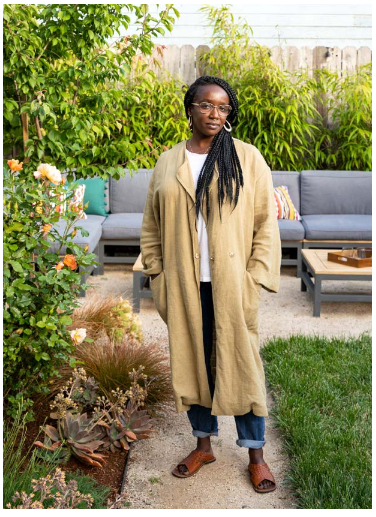Black Sanctuary Gardens, by Leslie Bennett (Pacific Horticulture Magazine, Summer 2019)
Black Sanctuary Gardens
by Leslie Bennett
What is a sanctuary space? Who needs it? Who owns it? And how do we create it?
Chef and food activist, Shakirah Simley writes about sanctuary as “the dire need to carve out physical, psy-chological, and social food spaces for those constantly on the periphery.” In the wake of Oakland’s shifting demographics and massive displacement, my artistic work aims to work within the realm of gardens and gardening to bring aesthetic refuge, nourishment, and cultural connection to black women and black spaces who have historically sustained, and continue to shape and preserve the Oakland community.
My lifelong interests in land use, environmentalism, design, and cultural preservation drive my creative work and help me build connections between people and the land with which they live. Urban environments are par-ticularly fertile ground on which to enhance people’s connection with the land and our varying cultural heritage by creating gardens whose value can be measured by the feelings their beauty inspires, the food they produce, and the stories about our histories and cultures that they tell.
Inspired in part by Alice Walker’s naming of the garden as a site for black women’s spirituality, creativity, and artistic work, I created the Black Sanctuary Gardens project in 2018, dedicated to black women as an act of caring, appreciation, and support for the many roles that black women play within our communities. I am collaborating with visual storyteller and project manager Elizabeth D. Foggie to design, install, and curate a series of aesthetic, edible, and culturally grounded garden installations. The gardens are co-created with selected partners to reflect and support their sometimes marginalized personal experiences, and will be installed in front and back yards, as well as historically black community spaces, so as to impact the lives of black women, and the family, friends, neighbors, and com-munities they live with and support.
Black Sanctuary Gardens takes an intersectional approach to urban garden design, connecting landscape preservation with individual and community vitality. The garden partner is both co-creator and participant, both storyteller and contributor over an indeterminate period of time, allowing the subject to evolve with the work itself. The sanctuary is ingested by all five senses, molding mental and physical space with living material. By documenting the process of both building and living with the garden, black women and black spaces have the opportunity to define themselves and their stories, reshaping the narrative we tell ourselves and also how we are perceived by others.
The audience for Black Sanctuary Gardens is the Oakland community—in particular black women who contribute to the Oakland community as teachers, artists, small business owners, and cultural com-munity leaders. Our first two garden project partners are Nwamaka Agbo, restorative economic practitioner (www.transformfinance.org), and Alena Museum (www.alenamuseum.com). Future partners will be selected from an evolving network of black female organizations to which I am connected. The work itself will be shared through traditional media and social media platforms, and through intimate garden gatherings put on by the partners themselves. I am also collaborating with The People’s Studio LLC, a film and media company, to document and disseminate these stories and garden transformations into the world beyond the Oakland area.
Last year, Black Sanctuary Garden’s first garden project with Nwamaka entailed transforming her East Oakland backyard into a beautiful, productive garden that includes plants that reflect her family’s cultural heritage. The garden also provides room for her to relax with family and friends, as well as to hold space for larger community groups in Oakland that she co-leads, such as the Black Women’s Freedom Circle. Black Sanctuary Gardens also received a matching grant of $8,000 from the East Bay Fund for Artists to install our first publicly accessible garden at Alena Museum, a nonprofit 501(c)3 creative space offering programming that includes black artist exhibitions, installations, and community programming for youth, open studio space, and the promotion of health and wellness. As of July 2018 we’d raised a total of $25,000 in individual and grant-based donations from our community; donations are still being accepted as we continue to partner with organizations and scout out new locations for future gardens.
Working with Alena Museum founder Seven Asefaha, our vision is to create a culturally informed, edible and medicinal garden installation that brings artists, community members, and social activists together, collaborating and renewing their relationship to nature in the midst of an industrial urban and displaced community. Alena Museum will own the garden installation on its property, however the real recipients and long-term co-creators of the visual and edible fruits of this space will be the Oakland community, who will have a green refuge and sanctuary space dedicated to supporting the black community to call their own. We are set to begin installation in August 2019, and open the garden to the public in September 2019.
As a small business owner, I have designed, installed and maintained aesthetic edible landscapes for private residences, businesses, and communities for more than ten years. I value the opportunity to develop my artistic practice as a designer through plant-based installations that address the relationships between people, their environments, and the human experience in an urban landscape. Black Sanctuary Gardens is a pivotal body of work from which to explore and delve deeper into the aesthetics, impact, and diversity possible in the garden design field I’ve grown to love.
Leslie is the creator of the Black Sanctuary Gardens project,
owner of Pine House Edible Gardens, and co-author of
The Beautiful Edible Garden (Ten Speed Press, 2013)




